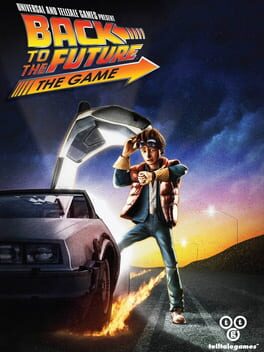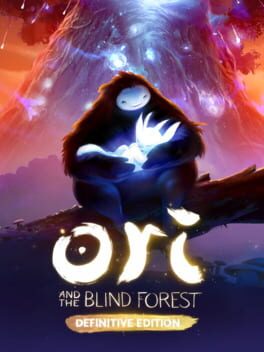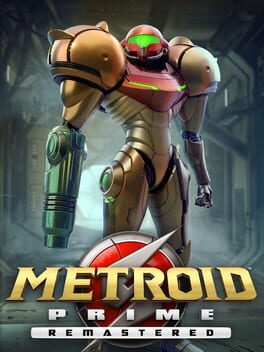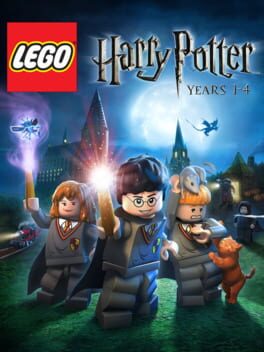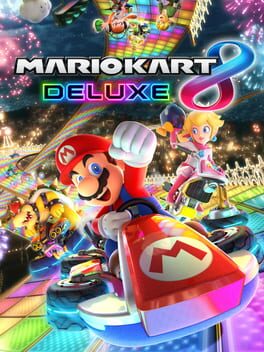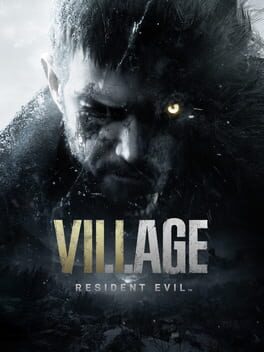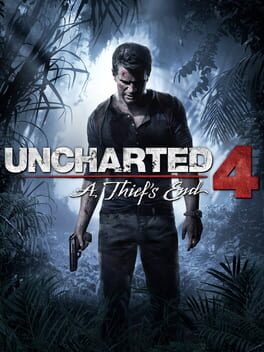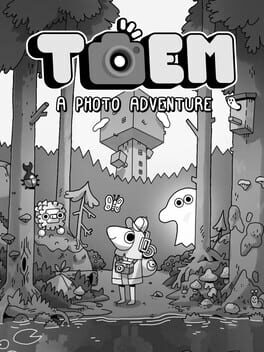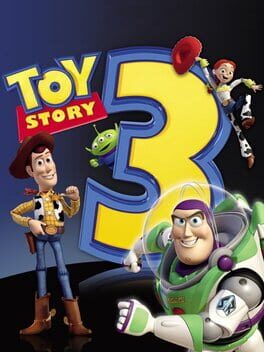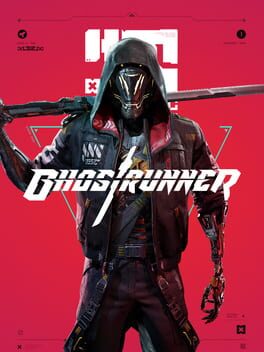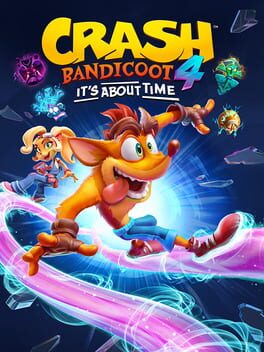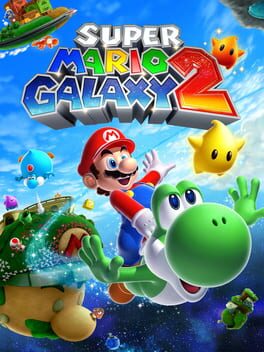TheWhat13
If you love Back to the future, give this game a shot. The gameplay can sometimes be a bit too cryptic, as a kid I NEEDED a guide for certain sections, but this is a Telltale game, you're here for the story, and this game's story is on point. A really interesting and enjoyable "sequel" to the movies, and with a point and click Telltale game, that's really all that counts.
TLDR: Ori and the Blind Forest is a wonderous experience, thanks to enchanting music, mind-blowing visuals and amazing animation, a simple yet moving story and mesmerizing movement. The best compliment I can present to this game is that the thing that pissed me off most was the fact the narrator's voice was in the Windows font, which ruined this game's perfect aesthetic choices.
This game's core theme being love is very apropos, as you can tell that the development team behind Ori and the Blind Forest loved their project, and video games as a whole.
From the iconic opening sequence, that you've probably heard of even if you haven't played the game to its closing sequence, this game's story surprised me with how good it was. It isn't anything grand or anything, but it follows its key themes well, offering a simple yet moving story that more than outweighed my very low expectations for a story in an "indie" metroidvania (putting indie in quotation marks because it was published by Microsoft).
And what a metroidvania this is. It is kinda linear, so maybe more hardcore fans of the genre won't like it as much, but even if you find this to be a poor metroidvania, it is one hell of a platformer. The movement here is incredibly deep and satisfying, and the developpers made the right choice when deciding for the game to not have boss fights at the end of the "dungeons" of the game, but platforming challenges. By the end of the game, your moveset gets so vast but yet remains so simple. The last section of the game is so incredibly satisfying, being a gauntlet of all that you've learned throughout your journey, and a grandiose bouquet offered by the dev team to show you just how good their movement is.
The animations and visuals are some of the most beautiful I have ever seen. Ori is such a well-designed character, shining on the screen at all times so you can hardly lose sight of him. The decor and ambiance is on point, and the animations are buttery smooth, making the movement that much more natural and satisfying.
The music is some of the best I have ever heard.
My only gripes with the game are very minor. A bit less linearity would've been nice, as It kinda stopped me from feeling lost in the world (lost in the sense of wonderous discovery, not frustrating "where do I go next ?"). I do not for the life of me understand why the ground pound was assigned to pushing the stick down, as it isn't very precise and does leed to some missed inputs. The combat is kinda whatever, and the devs know this, as the enemies are never roadblocks but rather minor action-based platforming challenges. it is however a bit frustrating that the devs decided nonetheless to force you into mandatory fights even with the lacking combat system. Finally, whoever decided to put the narrator's voice in the Windows 10 font needs to have a long look in the mirror and present a public apology.
This game's core theme being love is very apropos, as you can tell that the development team behind Ori and the Blind Forest loved their project, and video games as a whole.
From the iconic opening sequence, that you've probably heard of even if you haven't played the game to its closing sequence, this game's story surprised me with how good it was. It isn't anything grand or anything, but it follows its key themes well, offering a simple yet moving story that more than outweighed my very low expectations for a story in an "indie" metroidvania (putting indie in quotation marks because it was published by Microsoft).
And what a metroidvania this is. It is kinda linear, so maybe more hardcore fans of the genre won't like it as much, but even if you find this to be a poor metroidvania, it is one hell of a platformer. The movement here is incredibly deep and satisfying, and the developpers made the right choice when deciding for the game to not have boss fights at the end of the "dungeons" of the game, but platforming challenges. By the end of the game, your moveset gets so vast but yet remains so simple. The last section of the game is so incredibly satisfying, being a gauntlet of all that you've learned throughout your journey, and a grandiose bouquet offered by the dev team to show you just how good their movement is.
The animations and visuals are some of the most beautiful I have ever seen. Ori is such a well-designed character, shining on the screen at all times so you can hardly lose sight of him. The decor and ambiance is on point, and the animations are buttery smooth, making the movement that much more natural and satisfying.
The music is some of the best I have ever heard.
My only gripes with the game are very minor. A bit less linearity would've been nice, as It kinda stopped me from feeling lost in the world (lost in the sense of wonderous discovery, not frustrating "where do I go next ?"). I do not for the life of me understand why the ground pound was assigned to pushing the stick down, as it isn't very precise and does leed to some missed inputs. The combat is kinda whatever, and the devs know this, as the enemies are never roadblocks but rather minor action-based platforming challenges. it is however a bit frustrating that the devs decided nonetheless to force you into mandatory fights even with the lacking combat system. Finally, whoever decided to put the narrator's voice in the Windows 10 font needs to have a long look in the mirror and present a public apology.
This review contains spoilers
I played this 90% of the way through, only missing the Varia Suit and 7 Chozo Artifacts, but I shelved because I feel like I've seen most of the game and can form an opinion it.
I always find it hard to review Metroidvanias, as I often find myself pondering the question : am I lost because I'm dumb, or am I lost because the game hasn't done a good job at helping me ? I feel like your enjoyment of a metroidvania will wildly vary depending on how often you got stuck, but I do feel like a good metroidvania makes sure that you never get stuck too long, by indicating to you if you've done everything you could in a room for example, or by having a small number of "keys" that will work on a large number of "locks". I feel like Metroid Prime doesn't do the best job at telling you where to go, and has too many upgrades, which makes them not feel as useful as they should.
The game is good, great even if you are a hardcore Metroidvania fan. I enjoy them, but I do have to say that I prefer the ones that subtly guide you, which Metroid Prime did not do. It is the exact opposite to Metroid Dread: the latter is really linear, and sometimes even quite restrictive, whilst Prime can be incredibly opaque.
Simply put, the map feels small, and it feels like you are always going through the same rooms over and over again. Furthermore, it feels like the game does the worst job at subtly telling you where to go next, so I ended up wandering about very often, looking for a spot to use my new upgrade. Also, you'll see very early on a lot of areas that are restricted by upgrades, so even if you do memorise all the spots that are restricted by an upgrade, you then have to go to each and every one of them to check which of the half-dozen you saw is actually important. You'll get "incoming scans" every now and again to point you to an important area, but there were two that never actually popped up on my screen, and I only know they exist because walkthroughs told me "you should get this message on your screen." Also, f*ck X-ray visor-based progression, it just feels horrible as you kinda need to get lucky to think about using it and there's never any real environmental clue to tell you to use it.
However, when the game works, it works. I wouldn't recommend playing with a guide (except if you're starting to get frustrated) because that feeling of everything clicking together is very satisfying. The game is at its best when you are making major breakthrough after major breakthrough, quickly breaking the puzzle. But then you'll miss the one important thing and you'll be stuck again, only to realize you missed somehting trivial, like a breakable wall that you didn't see.
A few sidenotes:
- Not enough savepoints
- Hard to find a consistant strategy to avoiding damage in projectile-based combat
- I hate fast-travel usually, but I feel like this game would benefit from it
Metroid Prime is a classic, that's easy to understand why. I do however feel like the game works best when you have played it at least once, and that you have a rough idea of where every upgrade is and a vague plan in mind. Please play it, especially if losing yourself in a metroidvania is your schtick. If you enjoy metroidvanias but kinda hate getting lost, abstain or at least be prepared to read a walkthrough every now and again.
I always find it hard to review Metroidvanias, as I often find myself pondering the question : am I lost because I'm dumb, or am I lost because the game hasn't done a good job at helping me ? I feel like your enjoyment of a metroidvania will wildly vary depending on how often you got stuck, but I do feel like a good metroidvania makes sure that you never get stuck too long, by indicating to you if you've done everything you could in a room for example, or by having a small number of "keys" that will work on a large number of "locks". I feel like Metroid Prime doesn't do the best job at telling you where to go, and has too many upgrades, which makes them not feel as useful as they should.
The game is good, great even if you are a hardcore Metroidvania fan. I enjoy them, but I do have to say that I prefer the ones that subtly guide you, which Metroid Prime did not do. It is the exact opposite to Metroid Dread: the latter is really linear, and sometimes even quite restrictive, whilst Prime can be incredibly opaque.
Simply put, the map feels small, and it feels like you are always going through the same rooms over and over again. Furthermore, it feels like the game does the worst job at subtly telling you where to go next, so I ended up wandering about very often, looking for a spot to use my new upgrade. Also, you'll see very early on a lot of areas that are restricted by upgrades, so even if you do memorise all the spots that are restricted by an upgrade, you then have to go to each and every one of them to check which of the half-dozen you saw is actually important. You'll get "incoming scans" every now and again to point you to an important area, but there were two that never actually popped up on my screen, and I only know they exist because walkthroughs told me "you should get this message on your screen." Also, f*ck X-ray visor-based progression, it just feels horrible as you kinda need to get lucky to think about using it and there's never any real environmental clue to tell you to use it.
However, when the game works, it works. I wouldn't recommend playing with a guide (except if you're starting to get frustrated) because that feeling of everything clicking together is very satisfying. The game is at its best when you are making major breakthrough after major breakthrough, quickly breaking the puzzle. But then you'll miss the one important thing and you'll be stuck again, only to realize you missed somehting trivial, like a breakable wall that you didn't see.
A few sidenotes:
- Not enough savepoints
- Hard to find a consistant strategy to avoiding damage in projectile-based combat
- I hate fast-travel usually, but I feel like this game would benefit from it
Metroid Prime is a classic, that's easy to understand why. I do however feel like the game works best when you have played it at least once, and that you have a rough idea of where every upgrade is and a vague plan in mind. Please play it, especially if losing yourself in a metroidvania is your schtick. If you enjoy metroidvanias but kinda hate getting lost, abstain or at least be prepared to read a walkthrough every now and again.
(Played as part of the Lego Harry Potter Collection on PS4)
Lego Harry Potter is symptomatic of TT Game's new direction with Lego games, representing all that is wonderful about it, but also all that is problematic with it.
TT Games had a wonderful opportunity to make players explore Hogwarts with Lego charm, collecting Gold bricks, Red Bricks, characters (or rather the right to buy characters) and save students in peril. The Hogwarts collectathon is very fun. Exploring the castle is a dream come true, especially as the castle is really well made, with a lot of hidden rooms offering fun "puzzles". It can get a bit frustrating in the middle of the game, when it feels like you're always lacking a spell or a specific type of character to get to a room, but once all the spells and character classes are unlocked, exploring is really fun and satsifying, as these unlock whole new rooms rather than just making a collectible appear or something like that.
Sadly, the same can't be said about the levels. These are, like a lot of modern lego video games, dissapointing, taking a backseat to the exploration of the hub world. You're left with a lot of nothing levels, with a few good ones sprinkled in. But the repetition in the level themes (two quidditch levels, 4 Forbidden Forest levels) and overall quality of the levels just make them dissapointing. In Free Play, things aren't much better, as a lot of the colelctibles feel arbitrarily locked away in chests that need the Reducto spell or dark magic to open. It's a huge shame, especially when compared to the approach TT games had with Lego Star Wars, where free play unlocked whole new sections to the level and felt satisfying to replay. Free Play in this game just feels like "play the level again but this time pressing circle to unlock these chests will work !" which is poor incentive to replay.
One final complaint is that the spell selection is really boring, as the only things that changes is the color of the particles coming out of your wand. If you compare the spell selection in this game to the one in the second game, it's laughable, years 5-7 having spells that play differently than just "press circle".
This game isn't bad, exploring Hogwarts is wonderful, but it's the first example of Lego focusing a bit too hard on the "side content" that is exploration of the hub world (which won't interest everyone, as some people just want to get through the main story levels and be done) and completely forgetting to create interesting main levels. These complaints are the same I have for The Skywalker Saga, it's a shame to see that TT games haven't course-corrected in the 12 years separating the two games.
Lego Harry Potter is symptomatic of TT Game's new direction with Lego games, representing all that is wonderful about it, but also all that is problematic with it.
TT Games had a wonderful opportunity to make players explore Hogwarts with Lego charm, collecting Gold bricks, Red Bricks, characters (or rather the right to buy characters) and save students in peril. The Hogwarts collectathon is very fun. Exploring the castle is a dream come true, especially as the castle is really well made, with a lot of hidden rooms offering fun "puzzles". It can get a bit frustrating in the middle of the game, when it feels like you're always lacking a spell or a specific type of character to get to a room, but once all the spells and character classes are unlocked, exploring is really fun and satsifying, as these unlock whole new rooms rather than just making a collectible appear or something like that.
Sadly, the same can't be said about the levels. These are, like a lot of modern lego video games, dissapointing, taking a backseat to the exploration of the hub world. You're left with a lot of nothing levels, with a few good ones sprinkled in. But the repetition in the level themes (two quidditch levels, 4 Forbidden Forest levels) and overall quality of the levels just make them dissapointing. In Free Play, things aren't much better, as a lot of the colelctibles feel arbitrarily locked away in chests that need the Reducto spell or dark magic to open. It's a huge shame, especially when compared to the approach TT games had with Lego Star Wars, where free play unlocked whole new sections to the level and felt satisfying to replay. Free Play in this game just feels like "play the level again but this time pressing circle to unlock these chests will work !" which is poor incentive to replay.
One final complaint is that the spell selection is really boring, as the only things that changes is the color of the particles coming out of your wand. If you compare the spell selection in this game to the one in the second game, it's laughable, years 5-7 having spells that play differently than just "press circle".
This game isn't bad, exploring Hogwarts is wonderful, but it's the first example of Lego focusing a bit too hard on the "side content" that is exploration of the hub world (which won't interest everyone, as some people just want to get through the main story levels and be done) and completely forgetting to create interesting main levels. These complaints are the same I have for The Skywalker Saga, it's a shame to see that TT games haven't course-corrected in the 12 years separating the two games.
2017
HOW DO I EVEN REVIEW THIS IT'S LITTERALY MARIO KART 8 BUT BETTER
Mario Kart 8 was a critical success. Of course, it was stranded on the Wii U, so no one played it. This kinda brewed a perfect storm, as when the Switch launched, Nintendo could bring along a better version of a game that they already knew would be appreciated by the public (because it had already existed for 3 years at that point), all while insuring very good sales because the game would feel fresh to most players. It was a no-risk/huge reward situation.
As someone who played the original MK8 on the Wii U, I can say: I have no reason to go back to play it now that I finally bought Deluxe. The latter is better, it's as simple as that.
Let me just say I mainly played the single player modes on Deluxe, so I won't talk about the online. I also won't say that the track selection is amazing, the OST is a collection of bangers, that antigravity adds a lot to the track design and that the star cup is the best thing Nintendo has ever done, because all of the above is obvious and isn't new to this version of the game.
Only two major gameplay tweak were made : the addition of the ultra mini-boost (dumb name i know), which is just an extra level to drifting after the red boost, and the addition of a second item slot.
This second item slots make the game feel completely fresh. It's very simple: there are now more items into play: so there's more chaos, and more strategy.
Imagine for one second you're in the lead, and you have a defensive item (banana/shell/super horn) in your current slot, but a coin in your second slot. This may seem like an ok situation, but in reality, it's terrible: what if the guy behinds you has two offensive items ? He can just destroy your devensive item and get you again afterwards ! So, arriving at a double item box, you really ask yourself, do you try your luck and expose yourself for a few seconds while the items roll to try and get two defensive items, or do you prefer to stay as is, and risk that the guy behind you gets new offensive items to break through your defense ?
This new item strategy really made the game more difficult than on the Wii U. I actually didn't win every race against the CPU this time, even though I'm way better at holding good racing lines than before, simply because I could get f'ed over by items because of poor strategy.
200 CC is very fun, and really makes you think about your car setup. It really makes the cups competitive, because even the CPUs struggle with their speed. This leads to insane cups, where you may be fighting for the win with 4 or 5 CPUs. There was one cup where after me and Dry Bones taking an early championship lead, we were beaten in the last race by Daisy, who had been third this whole time, without me even noticing that she could still win the cup, because tipically, whichever CPU wins or finishes second in the first race will be the only one able to challenge you for first place in the standings. 200 CC was very refreshing in that sense, but also because it did feel way more skill-based than Mario kart usually is. You can more than make-up for bad item luck by gaining time by not crashing into the walls like the competition does. Sometimes, being hit by an item before a tight curve can even be an advantage, as it allows you to not gain too much speed heading into said-curve. 200 CC is very different than the rest of the game, but I wouldn't recomment playing exclusively in it, because heavens above that would get tiring.
Of course, the battle mode was changed in this, and it is leagues better. Cops and robbers is for short sessions, shine thief is my favourite, ballon-battle is always amazing and coin runners is ok.
If you were like me and said "I don't need MK8 deluxe, I've got MK8", shut up. This is way better. It makes MK8 defunct by comparison, and you can play it on the go, and nothign is better than playing Star Cup for the 100th time, but this time in your bed.
Mario Kart 8 was a critical success. Of course, it was stranded on the Wii U, so no one played it. This kinda brewed a perfect storm, as when the Switch launched, Nintendo could bring along a better version of a game that they already knew would be appreciated by the public (because it had already existed for 3 years at that point), all while insuring very good sales because the game would feel fresh to most players. It was a no-risk/huge reward situation.
As someone who played the original MK8 on the Wii U, I can say: I have no reason to go back to play it now that I finally bought Deluxe. The latter is better, it's as simple as that.
Let me just say I mainly played the single player modes on Deluxe, so I won't talk about the online. I also won't say that the track selection is amazing, the OST is a collection of bangers, that antigravity adds a lot to the track design and that the star cup is the best thing Nintendo has ever done, because all of the above is obvious and isn't new to this version of the game.
Only two major gameplay tweak were made : the addition of the ultra mini-boost (dumb name i know), which is just an extra level to drifting after the red boost, and the addition of a second item slot.
This second item slots make the game feel completely fresh. It's very simple: there are now more items into play: so there's more chaos, and more strategy.
Imagine for one second you're in the lead, and you have a defensive item (banana/shell/super horn) in your current slot, but a coin in your second slot. This may seem like an ok situation, but in reality, it's terrible: what if the guy behinds you has two offensive items ? He can just destroy your devensive item and get you again afterwards ! So, arriving at a double item box, you really ask yourself, do you try your luck and expose yourself for a few seconds while the items roll to try and get two defensive items, or do you prefer to stay as is, and risk that the guy behind you gets new offensive items to break through your defense ?
This new item strategy really made the game more difficult than on the Wii U. I actually didn't win every race against the CPU this time, even though I'm way better at holding good racing lines than before, simply because I could get f'ed over by items because of poor strategy.
200 CC is very fun, and really makes you think about your car setup. It really makes the cups competitive, because even the CPUs struggle with their speed. This leads to insane cups, where you may be fighting for the win with 4 or 5 CPUs. There was one cup where after me and Dry Bones taking an early championship lead, we were beaten in the last race by Daisy, who had been third this whole time, without me even noticing that she could still win the cup, because tipically, whichever CPU wins or finishes second in the first race will be the only one able to challenge you for first place in the standings. 200 CC was very refreshing in that sense, but also because it did feel way more skill-based than Mario kart usually is. You can more than make-up for bad item luck by gaining time by not crashing into the walls like the competition does. Sometimes, being hit by an item before a tight curve can even be an advantage, as it allows you to not gain too much speed heading into said-curve. 200 CC is very different than the rest of the game, but I wouldn't recomment playing exclusively in it, because heavens above that would get tiring.
Of course, the battle mode was changed in this, and it is leagues better. Cops and robbers is for short sessions, shine thief is my favourite, ballon-battle is always amazing and coin runners is ok.
If you were like me and said "I don't need MK8 deluxe, I've got MK8", shut up. This is way better. It makes MK8 defunct by comparison, and you can play it on the go, and nothign is better than playing Star Cup for the 100th time, but this time in your bed.
2017
This review contains spoilers
Resident Evil VII was one of my biggest dissapointments. Even though I had never played an RE game, the first half of the game was so good, that when I was confronted to that terrible second half/last third, I was gutted. Thankfully, Resident Evil : Village feels like Capcom taking a second shot at making Resident Evil VII, and they came through with a game that fuflills the promise of the first few hours of its predecessor.
I was surprised by just how good this game is. I never thought that I would appreciate non-linearity in a first person survival-horror game, but the standout feature of this game, to me, is the village. It acts as a hub world you can explore, and there's a good amount of treasure to find around it (new weapons, valuable goods...). I really appreciate the "escape game" formula of finding keys and objects to unlock new areas, so it was really nice to see it translate so well to a more open-ended playground.
As for the story sections, the game is way more consistent than Resident Evil VII, and you can tell that Capcom realised that they had gold in their hands with the first few hours of RE VII, gold they let fade into dust by the end of the game. Castle Dimitrescu is, gameplay-wise, a less scary and more exploration focused copy of the Baker House in Biohazard. It changed enough to feel fresh, and I appreciate Capcom bringing back this style of level, as it worked wonders in the previous game. The next two sections are shorter, and not as good as Castle Dimitrescu, but they shine in their own way. Beneviento is a fun house-sized puzzle (with a terrifying "baby" following you around, legitimately being the scariest thing in the whole game) which features no shooting and very little action. Its focus is purely on psychological torture, with Beneviento playing with Ethan's psyche with hallucinations and by making him take apart a doll of his wife. As for the Moreau section, its pretty weak gameplay wise, but Moreau's character is so weirdly endearing he carried this hour of the game for me. Side note: in general, the characters of this game are really good and memorable, except for Beneviento who just doesn't get much screen time.
The game does then start to lean back into its predecessor's main fault: switching to an action game. However, it's not nearly as bad. Firstly, this last quarter or so of the game still features a lot of exploration, most notably in heisenberg's factory. Secondly, despite the Chris Redfield action sequence being a pure FPS (which I should hate, since I don't want my survival-horror game to suddenly become Call of Duty), it's very short and getting to play as Chris is pretty cool. Also, huge mech fight. Sure, it seems thematically innapropriate, but it's fun. This action-heavy last quarter did hurt my enjoyment a bit, but it's far from being as bad as in RE VII.
A small note on the story: i appreciated this game feeling more connected to the larger plot of the resident evil franchise. I haven't played any other RE games except for VII, but I will say that the involvement of Umbrella, the Hound Wolf squad and the BSAA made me curious about the rest of the franchise, and it gives the game a bigger sense of importance. I even looked up a ton of info about these different corporations after the end of the game because of how spiked my curiosity was. RE VII was connected to the larger plot of the franchise, but only through logs and journals that I didn't really read while playing the game because they made no sense to me.
As for negatives, I feel like the economy is a bit broken. Doing just a bit of exploring will earn you truck loads of cash, and for a long while it feels like there's nothing to spend it on except for weapon upgrades. So you spend your money on said upgrades, and suddenly, with like an hour left in the game, the Duke (amazing character btw) puts up two new guns in his store that cost, in total, 300 000 lei, which I had already spent on useless upgrades. Introducing these guns earlier would've made more sense (as, with an hour left in the game, I didn't have much time to use them) and would've given me a chance to save up to buy them. I went from thinking to myself "exploring kinda breaks the game huh ?" to "how in the blue hell are you supposed to buy everything the game has to offer without exploring" and I'm not sure that's a good thing.
Overall, RE Village is terrific, and even though it still doesn't manage to keep its momentum to the very end, it does a much better job than its predecessor, and is a game I can't wait to revisit.
I was surprised by just how good this game is. I never thought that I would appreciate non-linearity in a first person survival-horror game, but the standout feature of this game, to me, is the village. It acts as a hub world you can explore, and there's a good amount of treasure to find around it (new weapons, valuable goods...). I really appreciate the "escape game" formula of finding keys and objects to unlock new areas, so it was really nice to see it translate so well to a more open-ended playground.
As for the story sections, the game is way more consistent than Resident Evil VII, and you can tell that Capcom realised that they had gold in their hands with the first few hours of RE VII, gold they let fade into dust by the end of the game. Castle Dimitrescu is, gameplay-wise, a less scary and more exploration focused copy of the Baker House in Biohazard. It changed enough to feel fresh, and I appreciate Capcom bringing back this style of level, as it worked wonders in the previous game. The next two sections are shorter, and not as good as Castle Dimitrescu, but they shine in their own way. Beneviento is a fun house-sized puzzle (with a terrifying "baby" following you around, legitimately being the scariest thing in the whole game) which features no shooting and very little action. Its focus is purely on psychological torture, with Beneviento playing with Ethan's psyche with hallucinations and by making him take apart a doll of his wife. As for the Moreau section, its pretty weak gameplay wise, but Moreau's character is so weirdly endearing he carried this hour of the game for me. Side note: in general, the characters of this game are really good and memorable, except for Beneviento who just doesn't get much screen time.
The game does then start to lean back into its predecessor's main fault: switching to an action game. However, it's not nearly as bad. Firstly, this last quarter or so of the game still features a lot of exploration, most notably in heisenberg's factory. Secondly, despite the Chris Redfield action sequence being a pure FPS (which I should hate, since I don't want my survival-horror game to suddenly become Call of Duty), it's very short and getting to play as Chris is pretty cool. Also, huge mech fight. Sure, it seems thematically innapropriate, but it's fun. This action-heavy last quarter did hurt my enjoyment a bit, but it's far from being as bad as in RE VII.
A small note on the story: i appreciated this game feeling more connected to the larger plot of the resident evil franchise. I haven't played any other RE games except for VII, but I will say that the involvement of Umbrella, the Hound Wolf squad and the BSAA made me curious about the rest of the franchise, and it gives the game a bigger sense of importance. I even looked up a ton of info about these different corporations after the end of the game because of how spiked my curiosity was. RE VII was connected to the larger plot of the franchise, but only through logs and journals that I didn't really read while playing the game because they made no sense to me.
As for negatives, I feel like the economy is a bit broken. Doing just a bit of exploring will earn you truck loads of cash, and for a long while it feels like there's nothing to spend it on except for weapon upgrades. So you spend your money on said upgrades, and suddenly, with like an hour left in the game, the Duke (amazing character btw) puts up two new guns in his store that cost, in total, 300 000 lei, which I had already spent on useless upgrades. Introducing these guns earlier would've made more sense (as, with an hour left in the game, I didn't have much time to use them) and would've given me a chance to save up to buy them. I went from thinking to myself "exploring kinda breaks the game huh ?" to "how in the blue hell are you supposed to buy everything the game has to offer without exploring" and I'm not sure that's a good thing.
Overall, RE Village is terrific, and even though it still doesn't manage to keep its momentum to the very end, it does a much better job than its predecessor, and is a game I can't wait to revisit.
This review contains spoilers
Summary : Uncharted 4: A Thief's End is the send-off Nate and the gang deserved. It's gameplay is the final form of the Uncharted formula (the similarities between this and Uncharted 3 are clear) and the story may be a bit confusing at first in its message, but is very enjoyable once you realise what it's really about, the characters making it a very enjoyable experience.
Uncharted 4 is better than what I remembered it being, which is insane since it already is one of my favourite games of all time.
The game starts off slowly. At first, this is voluntary, it's to create a mirror image between gameplay and story. Then, I'll be honest, the game just isn't very interesting. Italy and Scotland just aren't the best locals you'll visit in Uncharted. Italy is mainly climbing, the first half of Scotland forces you to do stealth. But then you get to the second half of Scotland, and oh boy. the game starts showing potential in its gameplay: fast, energetic, forcing you to think on your feet to maximise your stealth opportunities before entering thrilling gun fights, that arent based on precision, but on using the terrain to your advantage and being mobile. This is enabled thanks to great level-design, the encounters take place in locals with multiple floors, really giving you a chance to take different approaches to the same situation. The only miss in terms of gameplay from that point on is, without a doubt, the heavy enemies with machine guns, who force you to get two headshots in a row to kill. As I said, this game's philosophy isn't precision, it's emptying your gun into an enemy and, if you're lucky, you'll get that headshot. So forcing you to get not just one, but two headshots in a row, against enemies that fire a lot of ammo, and have tiny heads, is a weird choice. But for the reste, the gameplay is impeccable. Perfect pacing between calm moments and encounters, adding a few setpieces in there to make it an amazing game (chapter 11 is a perfect example of this).
As for the story: I remember being dissapointed the first time through. videogamedunkey put it very well: it feels like everything just magically solves itself. But, on my second playthrough, I got what the story was really about (and yes dunkey pointed it out too in another video): being saved by those who love you. In this game, Nathan is self-destructing, but Elena doesn't give him up. So, when Sam starts self-destroying, Nate helps him in return. Meanwhile, Rafe has no one to save him, so he goes mad because of his obsession with the treasure, and litteraly dies crushed by it. it isn't revolutionnary, it can even be a bit confusing in the delivery of its message, but it is more than servicable, and hot potato every character in this game is great.
Uncharted 4 is better than what I remembered it being, which is insane since it already is one of my favourite games of all time.
The game starts off slowly. At first, this is voluntary, it's to create a mirror image between gameplay and story. Then, I'll be honest, the game just isn't very interesting. Italy and Scotland just aren't the best locals you'll visit in Uncharted. Italy is mainly climbing, the first half of Scotland forces you to do stealth. But then you get to the second half of Scotland, and oh boy. the game starts showing potential in its gameplay: fast, energetic, forcing you to think on your feet to maximise your stealth opportunities before entering thrilling gun fights, that arent based on precision, but on using the terrain to your advantage and being mobile. This is enabled thanks to great level-design, the encounters take place in locals with multiple floors, really giving you a chance to take different approaches to the same situation. The only miss in terms of gameplay from that point on is, without a doubt, the heavy enemies with machine guns, who force you to get two headshots in a row to kill. As I said, this game's philosophy isn't precision, it's emptying your gun into an enemy and, if you're lucky, you'll get that headshot. So forcing you to get not just one, but two headshots in a row, against enemies that fire a lot of ammo, and have tiny heads, is a weird choice. But for the reste, the gameplay is impeccable. Perfect pacing between calm moments and encounters, adding a few setpieces in there to make it an amazing game (chapter 11 is a perfect example of this).
As for the story: I remember being dissapointed the first time through. videogamedunkey put it very well: it feels like everything just magically solves itself. But, on my second playthrough, I got what the story was really about (and yes dunkey pointed it out too in another video): being saved by those who love you. In this game, Nathan is self-destructing, but Elena doesn't give him up. So, when Sam starts self-destroying, Nate helps him in return. Meanwhile, Rafe has no one to save him, so he goes mad because of his obsession with the treasure, and litteraly dies crushed by it. it isn't revolutionnary, it can even be a bit confusing in the delivery of its message, but it is more than servicable, and hot potato every character in this game is great.
2021
2020
This game is one of the most generic games I have ever seen. The story is laughably bad, in part because of how predictable it is, with characters so archetypal and uninteresting that I started to believe that they were supposed to be a parody of other post apocaliptyc sci-fi worlds.
But who cares about story right ? I'm a gameplay guy, so what does the gameplay have to offer. The core concept isn't that bad to be honest. It's not extremely original, but it does have its moments. As for the execution, oh dear. Most of the game's problems with the core gameplay come from the fact that what determines if you can grab onto a wall or a rail or if you can dash doesn't depend on where your left stick is, but where your character is looking. If you're looking directly the wall, you won't be able to wall-run on it, you have to look in the direction you want to go. This is super dumb. Firstly, it's counterintuitive: my momentum is in one direction, but if I look the opposite way before reaching a wall I can do a complete, instant 180 turn with no regards to my momentum. Secondly, it leads to a lot of frustrating falls. If you're trying to pary a shot coming from behind you, you're going to fall. Thirdly, some of the level design doesn't take this stupid gameplay mechanic into account. In of the last levels, there's a section where you're sliding on multiple rails and have to jump from one to the other. In the middle of this section, there are two rails perpendicual from one another. Guess what ? If you don't turn your head 90 degrees in the second and a half between you leaving one rail and grabing onto the other, you character will grab the rail, and immediatly jump off. It's vaffling to me that in a game about parkour, momentum doesn't decide your direction, but where your eyes are does.
The cybervoid is hilariously bad. i legit cracked up when this game about a cyber ninja doind parkour in the future asked me to do a f*cking tetris puzzle. There's also a labyrinth later in the game because this is a bad video game so, like every bad video game, it needs to have a labyrinth.
The aesthetic of the Cyberworld is terrible as well, which is something you can say about 80% of the games' levels. Simply put, the world of Ghostrunner doesn't feel lived in, it feels like a mario bros level in 3D with a cyberpunk look, and not a good one at that.
On a positive note, the boss levels are decent, especially the first one. The final boss is laughable, as it amounts to "dodge, jump, dodge, jump, attack."
This game blows a fat one. I'm surprised I even played it all the way through, as it apart from a concept that's quite fun, it doesn't deliver anything surprising, as well as butchering the concept in its execution.
But who cares about story right ? I'm a gameplay guy, so what does the gameplay have to offer. The core concept isn't that bad to be honest. It's not extremely original, but it does have its moments. As for the execution, oh dear. Most of the game's problems with the core gameplay come from the fact that what determines if you can grab onto a wall or a rail or if you can dash doesn't depend on where your left stick is, but where your character is looking. If you're looking directly the wall, you won't be able to wall-run on it, you have to look in the direction you want to go. This is super dumb. Firstly, it's counterintuitive: my momentum is in one direction, but if I look the opposite way before reaching a wall I can do a complete, instant 180 turn with no regards to my momentum. Secondly, it leads to a lot of frustrating falls. If you're trying to pary a shot coming from behind you, you're going to fall. Thirdly, some of the level design doesn't take this stupid gameplay mechanic into account. In of the last levels, there's a section where you're sliding on multiple rails and have to jump from one to the other. In the middle of this section, there are two rails perpendicual from one another. Guess what ? If you don't turn your head 90 degrees in the second and a half between you leaving one rail and grabing onto the other, you character will grab the rail, and immediatly jump off. It's vaffling to me that in a game about parkour, momentum doesn't decide your direction, but where your eyes are does.
The cybervoid is hilariously bad. i legit cracked up when this game about a cyber ninja doind parkour in the future asked me to do a f*cking tetris puzzle. There's also a labyrinth later in the game because this is a bad video game so, like every bad video game, it needs to have a labyrinth.
The aesthetic of the Cyberworld is terrible as well, which is something you can say about 80% of the games' levels. Simply put, the world of Ghostrunner doesn't feel lived in, it feels like a mario bros level in 3D with a cyberpunk look, and not a good one at that.
On a positive note, the boss levels are decent, especially the first one. The final boss is laughable, as it amounts to "dodge, jump, dodge, jump, attack."
This game blows a fat one. I'm surprised I even played it all the way through, as it apart from a concept that's quite fun, it doesn't deliver anything surprising, as well as butchering the concept in its execution.
This review contains spoilers
I played about 40% of the game before giving up on it. It's not bad at all, but simply put: it felt like déjà vu. If you've played the N.Sane Trilogy, you've played this. Since I didn't play all the way I don't really feel like writing a full review, so I'll just list off a thew things.
- Aesthetically the game is pleasing, and the skins look good (it's a shame that there such a chore to unlock). Animations are pretty good, with the wall run being a particularly good one.
- Gameplay wise: it's Crash Bandicoot, nothing new here, which explains why I just kinda gave up on it: I played the N.Sane trilogy two years ago, and this is just more of that.
- The game is full of gimmicks. The quantum masks are gimmicks, the extra characters are gimmicks, N.Verted levels are a gimmick... This feels like a marketing department's dream more than a passion project. Also, surprisingly, the gimmicks really don't freshen up the game that much. I tried two quantum masks, two characters, and three N.verted levels. The latter are just the same stages you play during the base campain but inverted and with a filter (at least the three I did were just that), the quantum masks aren't really interesting and out of the two extra characters I played, only one felt like a different character, that being Dingodile. Thing is, Dingodile is cool, but he feels so out of place ! It feels like a different game ! I think this approach really hurt the game, and made it quantity over quality, because the base platforming really isn't anything special.
- The level design is okay. The settings the stages take place in are okay, with the Bayou being a great idea. It's a shame there's only one level that really stuck with me, thanks to its amazing ambiance (the level in question being "Off Beat").
Overall, I was dissapointed. N.Sane trilogy was a great remake of classic games, this is a dissapointing, gimmick-filled sequel.
- Aesthetically the game is pleasing, and the skins look good (it's a shame that there such a chore to unlock). Animations are pretty good, with the wall run being a particularly good one.
- Gameplay wise: it's Crash Bandicoot, nothing new here, which explains why I just kinda gave up on it: I played the N.Sane trilogy two years ago, and this is just more of that.
- The game is full of gimmicks. The quantum masks are gimmicks, the extra characters are gimmicks, N.Verted levels are a gimmick... This feels like a marketing department's dream more than a passion project. Also, surprisingly, the gimmicks really don't freshen up the game that much. I tried two quantum masks, two characters, and three N.verted levels. The latter are just the same stages you play during the base campain but inverted and with a filter (at least the three I did were just that), the quantum masks aren't really interesting and out of the two extra characters I played, only one felt like a different character, that being Dingodile. Thing is, Dingodile is cool, but he feels so out of place ! It feels like a different game ! I think this approach really hurt the game, and made it quantity over quality, because the base platforming really isn't anything special.
- The level design is okay. The settings the stages take place in are okay, with the Bayou being a great idea. It's a shame there's only one level that really stuck with me, thanks to its amazing ambiance (the level in question being "Off Beat").
Overall, I was dissapointed. N.Sane trilogy was a great remake of classic games, this is a dissapointing, gimmick-filled sequel.
2010
Sadly, my Wii Remote died three quarters of the way through the game, so I couldn't finish it. I do feel like I have a pretty good understanding of the game though, sufficient to write a decent review.
Super Mario Galaxy was a revolution in the mario world. It was totally different than any other 3D mario game, or any other mario game for that matter. It's focus on atmosphere rather than gameplay made it unique. Revisiting it was a bit of a challenge for me, as I feel the gameplay has aged and isn't the most riveting Mario has been.
Super Mario Galaxy 2 places the focus beck on gameplay. This game is extremely fun, with amazing gimmicks for every level. No level is a chore, the platforming is tight, Yoshi is a great addition and the powerups are creative.
However, I do have to say, this game feels like it lacks personality. It's probably because its predecessor has so much of it, but Super Mario Galaxy 2 really reminded me of Super Mario 3D Land or 3D world in the sense that feels very... safe. The levels are great but don't feel nearly as memorable as the ones from the first game. The music is very good, but feels like Mario Music, and is nowhere near as good as the symphony that is super mario galaxy. Starship Mario is a great hub, its small size is benefitial to it as it makes getting to where you want to be really easy and effortless, but it isn't the comet observatory.
If I had to describe this game, I would say it's Super Mario 3D world with a Super Mario Galaxy skin. This isn't a dig: I loved my time with the game. But I do have to say, I do feel like the 3D World and Galaxy are better games because they are focused : one is an amazing obstacle course type game with very few thrills, the other is an atmospheric mario game with subpar level design (when compared to other mario games of course, it's way above average when you compare it to the broader video game landscape). Super Mario Galaxy 2 doesn't achieve the picture-perfect level-design of 3D World or the picture-perfect atmosphere of the original, so, to me, it feels like the worst of the three, as it is competent, even good, in every department, but excells in none.
Super Mario Galaxy was a revolution in the mario world. It was totally different than any other 3D mario game, or any other mario game for that matter. It's focus on atmosphere rather than gameplay made it unique. Revisiting it was a bit of a challenge for me, as I feel the gameplay has aged and isn't the most riveting Mario has been.
Super Mario Galaxy 2 places the focus beck on gameplay. This game is extremely fun, with amazing gimmicks for every level. No level is a chore, the platforming is tight, Yoshi is a great addition and the powerups are creative.
However, I do have to say, this game feels like it lacks personality. It's probably because its predecessor has so much of it, but Super Mario Galaxy 2 really reminded me of Super Mario 3D Land or 3D world in the sense that feels very... safe. The levels are great but don't feel nearly as memorable as the ones from the first game. The music is very good, but feels like Mario Music, and is nowhere near as good as the symphony that is super mario galaxy. Starship Mario is a great hub, its small size is benefitial to it as it makes getting to where you want to be really easy and effortless, but it isn't the comet observatory.
If I had to describe this game, I would say it's Super Mario 3D world with a Super Mario Galaxy skin. This isn't a dig: I loved my time with the game. But I do have to say, I do feel like the 3D World and Galaxy are better games because they are focused : one is an amazing obstacle course type game with very few thrills, the other is an atmospheric mario game with subpar level design (when compared to other mario games of course, it's way above average when you compare it to the broader video game landscape). Super Mario Galaxy 2 doesn't achieve the picture-perfect level-design of 3D World or the picture-perfect atmosphere of the original, so, to me, it feels like the worst of the three, as it is competent, even good, in every department, but excells in none.
2019
A Short Hike is a very small game, that costs 7 euros. Yet it is the best emulation of life I have seen in video games.
Simply put, no game has ever come this close to emulating what a summer day feels like. You just wander around the island, talking to neighbors, with very simple yet charming dialogue, going from little activity to little activity, discovering a thousand very small things.
I could talk about the gameplay, or go more in depth about why this is fun. But really, I don't want to. Firstly, because if I described the gameplay, you'd think this game sucks because it's very basic and is basically a mash-up of Animal Crossing and BOTW/Celeste. But most importantly, this game is an experience, one of the few games where I wasn't constantmy judging it, critiquing it in my brain. I just got immersed. Play this, because no review will ever translate how perfect it is.
I'm holding back a star because I just feel like I can't give 5 stars to a game this short, even though its short length is one of its strongest assets.
Simply put, no game has ever come this close to emulating what a summer day feels like. You just wander around the island, talking to neighbors, with very simple yet charming dialogue, going from little activity to little activity, discovering a thousand very small things.
I could talk about the gameplay, or go more in depth about why this is fun. But really, I don't want to. Firstly, because if I described the gameplay, you'd think this game sucks because it's very basic and is basically a mash-up of Animal Crossing and BOTW/Celeste. But most importantly, this game is an experience, one of the few games where I wasn't constantmy judging it, critiquing it in my brain. I just got immersed. Play this, because no review will ever translate how perfect it is.
I'm holding back a star because I just feel like I can't give 5 stars to a game this short, even though its short length is one of its strongest assets.
2007
This game has everything to be great. The pitch is great, the puzles are fun, the only character in the game is very funny. However, you can just feel that the game doesn't deploy its full potential. Just by playing the bonus rooms, you realise how little the base game exploits its mechanics, and relies a bit too much on the "fast thing comes in, fast thing comes out" mechanic, even though there were a hundred different ways to use the portal mechanic. Plus, the last trunk of the game dragged for too long.
However, the one thing this game suprised me with was its eery ambiance. The writings on the wall you can find behind the test room, the weird jokes made by GladOs, all lead you to believe that something is wrong.
This game was made to have a sequel, because of how under-exploited it feels, but it perfectly mixes humour and horror.
However, the one thing this game suprised me with was its eery ambiance. The writings on the wall you can find behind the test room, the weird jokes made by GladOs, all lead you to believe that something is wrong.
This game was made to have a sequel, because of how under-exploited it feels, but it perfectly mixes humour and horror.
